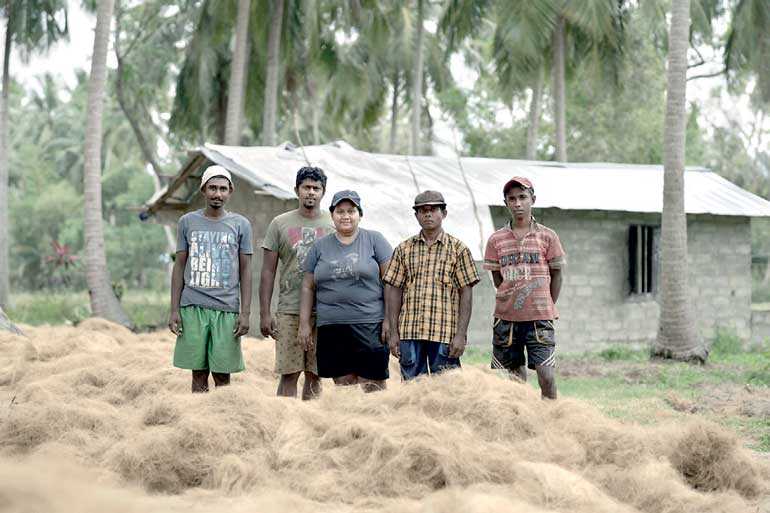Tuesday Feb 17, 2026
Tuesday Feb 17, 2026
Tuesday, 30 March 2021 00:39 - - {{hitsCtrl.values.hits}}

Rose Priyani Fernando started her business last year. Facing numerous challenges due to the lockdown, the advance credit through the VCF intervention helped pay for necessary raw materials and transport of goods
 The path to economic recovery ahead remains difficult and prone to global setbacks, and here in Sri Lanka the resurgence of the pandemic has shown just how difficult and steep the ascent to recovery can be. Not just large-scale businesses have been affected by the significant disruptions in their supply chains and financial losses. Small scale producers, those who operate at the very grassroots level and have fewer than 50 employees, have felt the impact adversely.
The path to economic recovery ahead remains difficult and prone to global setbacks, and here in Sri Lanka the resurgence of the pandemic has shown just how difficult and steep the ascent to recovery can be. Not just large-scale businesses have been affected by the significant disruptions in their supply chains and financial losses. Small scale producers, those who operate at the very grassroots level and have fewer than 50 employees, have felt the impact adversely.
Aiming to facilitate a pragmatic and effective approach to the operational and financial challenges that Micro, and Small Enterprises (MSEs) are facing, the International Labour Organization (ILO) introduced a value chain financing (VCF) model in Sri Lanka to help propel economic survival and revival. The VCF model thrives on a strong and mutually beneficial buyer-supplier relationship and can be adapted and implemented in any sector of the economy – be it manufacturing, agriculture or services. The ILO initially commenced a pilot VCF with the coconut and coir industry in Sri Lanka.
Here are some insights into the VCF model, the ILO’s approach and how this aims to help MSMEs build back better.
The impact on Micro and Small Enterprises (MSE) sector in Sri Lanka
The onset of the pandemic triggered an economic downturn, which has negatively impacted MSEs across Sri Lanka. A large number of players in the MSE sector rely on a steady stream of cash to operate their businesses effectively. The lockdown(s) brought many a business operation to a halt, resulting in the lack of working capital. A significant proportion of MSEs in Sri Lanka struggled to secure working capital through more formal channels for a number of reasons, including a lack of credit history or a poor credit rating or an inability to offer collateral.
In searching for effective measures to help MSEs re-start and/or continue their business operations, the ILO introduced a model for value chain financing; an effective and pragmatic approach to providing business owners with access to sufficient working capital.
|
Ranjith from Tharana Udawela, Kurunegala, hopes to use funds received from the ILO to increase occupational safety and health standards at his business and construct a cement floor for drying coco peats
|
|
Thus far, the ILO has been engaging with 93 raw husk processing suppliers which has resulted in benefits to over 1,000 working people out of which approximately 50% are women
|
What exactly is Value Chain Financing?
The basic premise of VCF pivots around the strength of the buyer-seller relationship. In fact, success depends on the ‘trust’ that both parties build working together toward mutual economic benefit.
VCF ensures that sellers receive necessary working capital from their buyers which comes as a loan to allow them to produce the products. Later, the loan amount is settled in full or adjustments made while selling these products to the buyer. Generally speaking, there are two forms of value chain financing; direct and indirect. In the latter, financial institutions such as banks are the source of providing a loan or credit-line to micro and small-scale businesses on the strength of their buyers’ reputation. For example, if the small business in question is involved in the apparel value chain, a financial institute would offer credit to the business if a reputed buyer from the apparel industry having commercial transaction with the financial institute vouches for the business.
In general, VCF is a tool used to increase returns for all stakeholders and growth and competitiveness along the supply chain. In Sri Lanka, the VCF model is practiced in a somewhat informal and ad hoc manner, especially in the agricultural sector. But often value chain financing of this form is carried out in an exploitative manner, in which the buyers (commonly known as middlemen) exploit the farmers.
The pandemic triggered downturn in MSE activities and access to working capital urgently called for a much better, more comprehensive and reliable model of value chain financing. One where their vulnerability does not lead to exploitation and indebtedness.
Implementing the Value Chain Financing Model in the coconut and coir industry
The intention of introducing a viable VCF model in the coconut and coir industry has been to create a working model that can be applied to any sector where buyers have a strong dependency on producers for supplies.
Having had a number of years of exposure to the industry though collaboration with the Coconut Substrate Exporters Association of Sri Lanka, the ILO approached industry members who were willing to advance credit to their MSE raw husk processing suppliers with the intention of receiving inputs they need to continue their exports. Four of Sri Lanka’s largest coir and coconut related product exporters partnered with the ILO to move forward with this initiative.
The partnership guaranteed that the ILO would cost share an equal amount of any loan that the company would provide to the MSE supplier as a grant, to be used for improving Occupational Safety and Health and working conditions, machinery acquisition or similar capital investment at the suppliers’ level. Accordingly, both MSEs and buyers would benefit from the resulting improved business conditions and quality of the products. Thus far, the ILO has been engaging with 93 raw husk processing suppliers which has resulted in benefits to over 1,000 working people out of which approximately 50% are women.
At its core, value chain financing provides an alternative but effective financing model for micro and small businesses, which often remain outside the target of the formal financial sector. A very encouraging aspect is that this model can be adopted and replicated in any sector with strong buyer-seller relationships.
This VCF intervention is part of an ILO-led initiative in Sri Lanka to facilitate the healthy socio-economic recovery of the Micro and Small Enterprise sector from the negative impacts of the COVID-19 pandemic.
(The writer is Director, International Labour Organization, Country Office for Sri Lanka and the Maldives.)